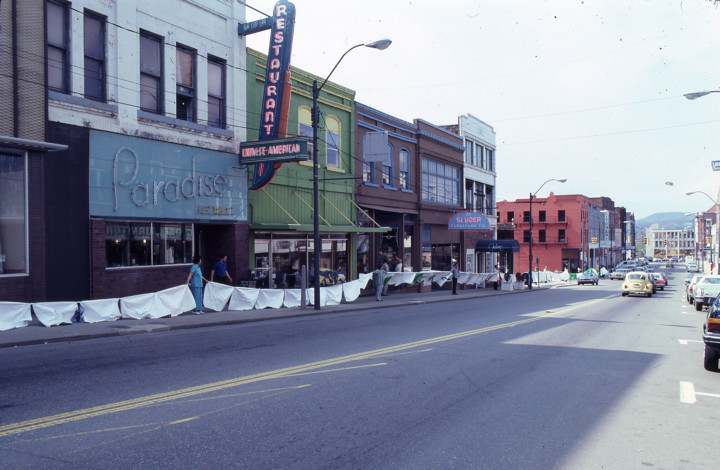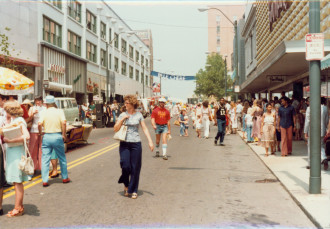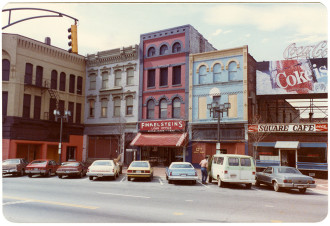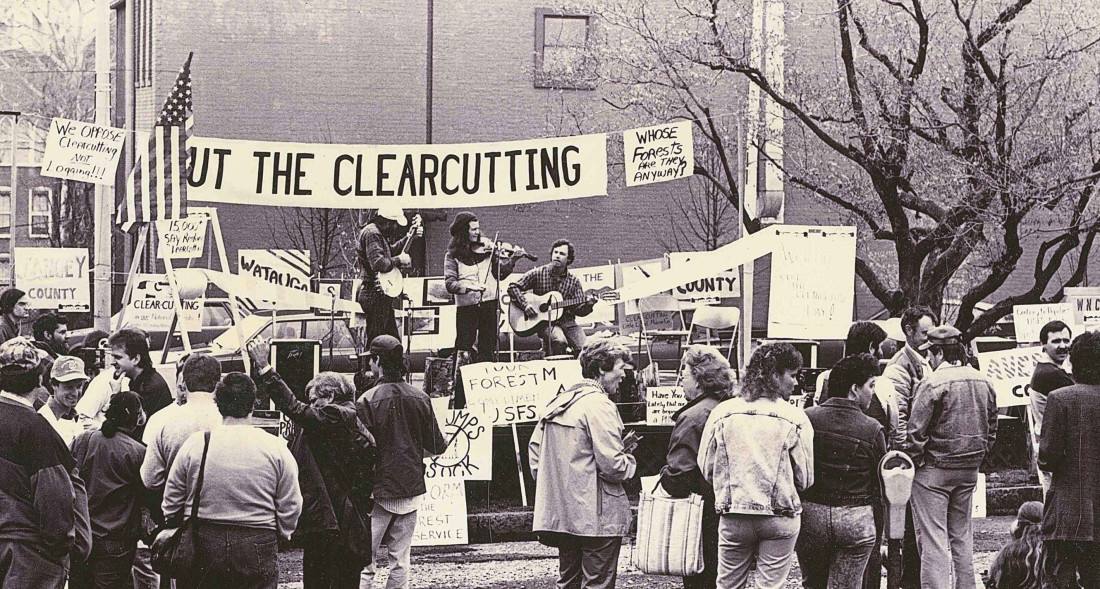Editor’s note: The next session, “Social Activism and Social Agencies in the 1980s,” takes place Wednesday, June 29, from 6-7:30 p.m. In the 1980s, Asheville was a smaller community, and that made everything — including social change — seem possible. Dedicated individuals worked together to tackle social problems such as the AIDS epidemic, threats to the environment, violence against women, legal inequality, hunger, and child welfare. Learn about the evolution of social activism and the subsequent formation of nonprofit organizations in Asheville from some of those early “can-do” leaders. Moderators: Ann Von Brock, Ellen Clarke. Panelists: Jeff Fobes, Gaylen Ehrlichman, Ed Hay, Deborah Miles
“I have met so many new people who’ve come to live in Asheville, and not one of them knows that at one time there was a very serious threat of the entire downtown being leveled and a suburban mall [being] plunked down in that space,” says Jan Schochet, a local business owner who was involved in the ultimately successful Save Downtown Asheville movement, along with author Wayne Caldwell and other concerned residents. “It was a two-year fight with lots of mud slung,” she adds.

That 1980s struggle will be the focus of a Wednesday, April 27, panel discussion, the first in a monthly local history series at Pack Memorial Library, which will feature some of those involved from both sides — with Schochet and Caldwell moderating.
“Asheville in the 1980s was a ripe place for social action,” notes Ann Von Brock, special projects manager for the United Way of Asheville and Buncombe County. “People’s willingness to take on difficult issues was a tribute to the love and ownership they felt toward their community. This web of social activism still grows and evolves as we continue to face challenges. It is in the very fiber of Asheville,” she adds.
Asheville’s revitalization today can easily be seen in its blossoming beer culture, booming hotel industry and growing national profile as a tourist destination. But Asheville’s current popularity owes much to the efforts of residents over the past several decades who helped make the city the special destination it is today.
Asheville in the 1980s is a six-part series, led by local movers and shakers of the 1980s, that will focus on how businesses, initiatives and residents of that decade helped shape the town we know today.
Bringing history to light
Tucked around a corner in the basement of downtown Asheville’s Pack Memorial Library, you will find the North Carolina Collection. In lieu of a general history museum, the N.C. Room, as its called, is the go-to resource for historians, genealogists and those curious to learn more of the region’s history. It’s also hosting the Asheville in the 1980s series.
In addition to history exhibits, filing cabinets full of microfiche reels, boxes of old photographs, historic books, postcards, oral histories and city directories, you’re also likely to find Zoe Rhine, one of the librarians in charge of the North Carolina Collection and the author of its Heard Tell blog.
Rhine says her interest in putting together the ‘80s panel discussions stemmed from a conversation earlier this year with Julie Niwinski, head of adult services at Pack Library.

“My first thought was to have just one program focusing on business owners who were here,” says Rhine. “I took the idea to Julie, and her mouth dropped open — I couldn’t even finish my sentence, because she had just been talking a few days before with a friend about all that was happening in Asheville in the ’80s in terms of social advocacy and social agencies.”
“It just felt like it had been neglected as part of Asheville’s renaissance and revitalization, as far as a foundation for the butterfly that came out in the ’90s,” Niwinski explains. “Asheville is very indebted to Roger McGuire and Julian Price and the work they did in the 1990s, [but] there had to have been that work going on in the ’80s to bring that about, like Asheville’s cocoon. What’s so important and that often gets missed is the citizens and the community and the million hours of volunteerism and some of our political leaders that worked so hard.”
Once the series got the go-ahead, Rhine set to work selecting topics and moderators from among those involved in that era’s actions, events and businesses. Panelists were selected based on their firsthand experience.
Filling in the recent gaps
“Everyone we take this project to, they start talking about their favorite store and then another place, and they can’t stop. It just builds and builds,” Rhine says.
Rhine and Niwinski hope that the discussions will elicit more contributions from the community to help document this period in the library’s collection. “We have a lot more on the 1880s and the 1920s than we have on the 1980s,” Rhine notes.
A quick glance through a stack of 1980s appraisals awaiting indexing at the North Carolina Collection shows a different view of Asheville — a town on its way to resembling Asheville as we recognize it today.
“Visitors and newcomers think that Asheville suddenly became an artists center,” Schochet says. “That’s simply not true. There were wonderful bookstores back then downtown. The art museum was coming into its own. A film series began which screened art films every two weeks. More and more people were coming to see Shindig on the Green, which featured local mountain music and provided a place to play and jam away from the stage during the show and for hours after.”

While the number of options and venues to explore local artistic endeavors may not have been as plentiful as they are today, Schochet contends that the limited number of venues fostered a tightknit community.
“The gathering places were places to check in with artists and art-oriented people,” she reports. “We knew what was coming up through community at Stone Soup and High Tea restaurants, [and] WCQS was coming into its own. ”
Six looks at the ’80s
The six sessions of the Asheville in the ’80s series will be led by people with firsthand experience of events. The program’s will also be recorded for inclusion in the archives.
“This is an opportunity to collect stories from a primary source while people are still here and care, and we can talk about it.” says Niwinski.
The six discussions will take place on the last Wednesday of each month, beginning April 27, from 6-7:30 p.m. in the Lord Auditorium at Pack Memorial Library, continuing through the summer. Turnouts for prior history series have been large often with 70-100 attendees, so it’s a good idea to arrive a little early to find a seat.
The series schedule is:
- Wednesday, April 27, “Save Downtown Asheville & the Wrap”
- Wednesday, May 25, “Businesses, Restaurants and Food Stores”
- Wednesday, June 29, “Social Activism and Social Agencies”
Wednesday, July 27, “The Arts: Performing, Visual and Literary” - Wednesday, Aug. 31, “New Housing and Old Buildings”
- Wednesday, Sept. 28, “Politics and Civic Engagement”
Visit the North Carolina Collections website for more information.
— Originally posted on April 22, 2016.



Before you comment
The comments section is here to provide a platform for civil dialogue on the issues we face together as a local community. Xpress is committed to offering this platform for all voices, but when the tone of the discussion gets nasty or strays off topic, we believe many people choose not to participate. Xpress editors are determined to moderate comments to ensure a constructive interchange is maintained. All comments judged not to be in keeping with the spirit of civil discourse will be removed and repeat violators will be banned. See here for our terms of service. Thank you for being part of this effort to promote respectful discussion.